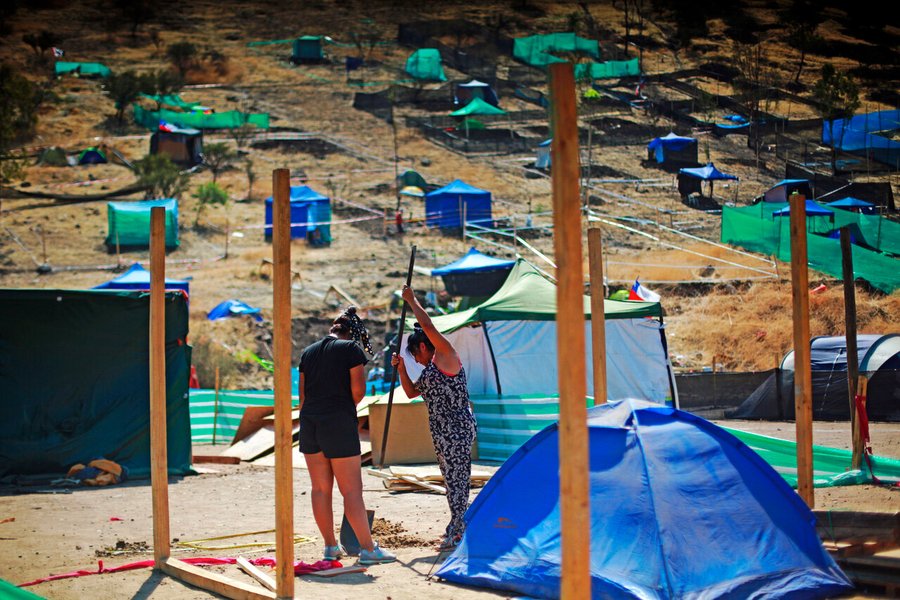In a new session of the cycle of Debates "EU-Chile Counterpoints for the Constituent Process", organised by the European Union Delegation in Chile in conjunction with a group of Chilean universities, the Italian academic Laura Fregolent and the Austrian specialist Susanne Bauer, experts from the EU EUROsociAL+ Programme, spoke about the social housing model in Italy and in the city of Vienna, respectively.

Photo courtesy of the University of Santiago de Chile
Public and social housing in Italy
Laura Fregolent, professor of Urban Planning and Technology at the Università Iuav di Venezia, offered a comprehensive analysis of housing policies in Italy over the years, firstly highlighting the constitutional consecration of the right to housing in Article 47 of the Italian Constitution. Fregolent pointed out that, as a result of the social policies established by this right, “70% of Italian families live in their own home. It is their property instead of being a rented house”.
Prominent in the Italian architect’s presentation was the fundamental role that the State played in house building in the second half of the 20th century, before later taking on a more secondary role. She points out that as a result of constitutional reform in 2001, the state lost its exclusive control over housing.
In 2008, a law defined social housing as “the set of housing services aimed at satisfying basic needs.” She pointed out that public policies during this period were more oriented towards satisfying housing deprivation and social vulnerability in order to offer affordable rented housing.
She added that access to housing was made more difficult by the progressive decline in state involvement in housing issues and reforms which were introduced that were increasingly oriented toward conceiving housing as a market-based asset. Evictions for non-payment of rent have doubled, with the number of homeless people on the rise.
At the end of her presentation, she delivered a series of recommendations that could be considered to improve these problems, among them, attracting private capital or being able to provide different income ranges to encourage social mixing and thus being able to avoid concentrations of more disadvantaged population groups.
The Viennese model of social and accessible housing
Susanne Bauer, head of international affairs at the “Wiener Wohnen Kundenservice” and chair of the Eurocities Working Group on Housing, firstly clarified that although the right to decent housing is not guaranteed in the Austrian Constitution, “it is included in Austrian regulations in a provision for homeless people and support for homeless people and in precarious situations, which is included in a provision on housing”. In Austria, municipal housing managed by each municipality and by real estate associations offers a stock of social and public housing.
Bauer said that public policies in Austria have dealt with the housing problem through municipal housing policies, which date back over 100 years. She added that the key has been the provision of quality housing for the widest range of population possible. “Today 60% of Viennese people live in social housing with affordable rents.” Bauer pointed out that this is a political commitment in Vienna. She emphasised that “in Vienna the image of assuming responsibility for people’s social protection is very strong and housing plays a very important role in this, as low-income families especially depend on affordable housing to facilitate a decent life.” In any case, these affordable homes can only be offered with certain limitations, together with private investors in the real estate market.
Vienna seeks to encourage residential building construction through subsidies that permanently increases the number of dwellings for social housing. There is a programme in place which private rental homes are subject to temporary obligations, especially if these funds are used to renovate homes, as well as a 15 year rental limit and grants that have to be used for renovations. This has been going on for 40 years, improving neighbourhoods and offering more affordable housing in areas with little social housing. In addition, the city offers support to tenants in these homes in the form of services such as management or legal advice connected with renting.
The Austrian specialist points out that an active housing policy should also be inclusive. This is key in Viennese politics. Housing is not only aimed at lower-income social groups, it is also intended to cover the majority of the population, and, as a result, is also aimed at middle-income earners.
Regarding the legal framework on the right to housing, Bauer pointed out that there are different laws at the national or regional level, referring to laws such as the rights and duties of tenants or the limitation on income or earnings, which limits the way in which players in the real estate market can manage their income.
Conclusions
At the end of the debate and encouraged by questions from the public, the experts concluded that, although the consecration of the right to housing in the new Constitution is important, the way it is effectively implemented is also very important.
The cycle of debates “EU-Chile Counterpoints for the Constituent Process” is organised by the European Union Delegation in Chile, through the EUROsociAL+ Programme, together with LEXEN, the Inter-Faculty Centre for Law, Economics and Business at the University of Chile; the Centre for Future Studies at the University of Santiago and the European Studies Programme at the University of Concepción, in collaboration with El Mostrador.
See the full session on the EUROsociAL+ Channel on YouTube.



